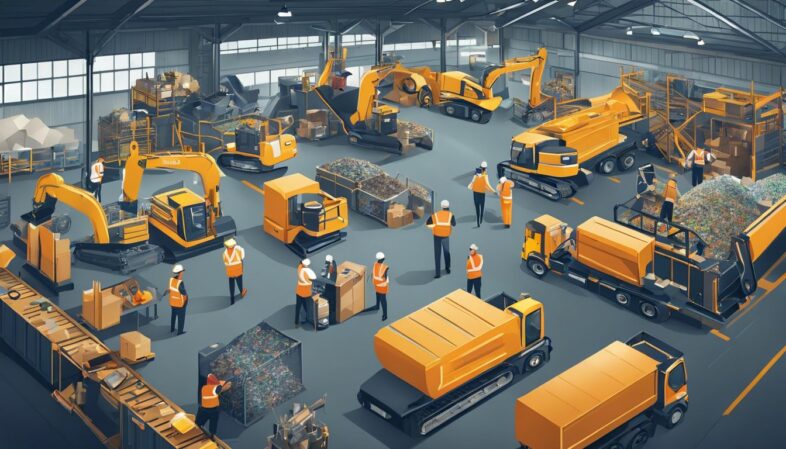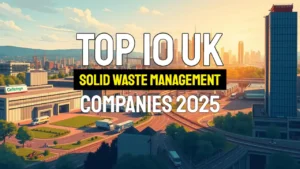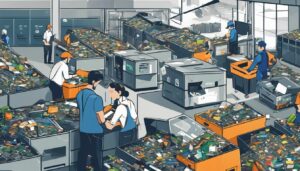Recycling turns rubbish into something new, and the best waste companies with recycling programmes are great examples of how this can work. It's a big part of the circular economy, where we keep using materials over and over instead of making waste. This article talks about how top UK firms help this happen.
Waste Management Companies like Veolia, Biffa, SUEZ, and Viridor Ltd are leading globally on the way to turning what we throw away into useful stuff again. In cities like Singapore and Vienna, they're good at recycling.
These companies find creative ways to make less rubbish and use resources better. Our world is changing with their ideas for making things last longer and cutting down on waste costs.
They show us exciting steps towards keeping our planet clean.
Let's explore these green giants in action!
Key Takeaways for Waste Companies with Recycling Programmes
- UK recycling firms like Veolia, Biffa, SUEZ, and Viridor are leading the way in sustainable waste management.
- These companies innovate by turning waste into resources such as clean energy, new products and biofuels.
- Their recycling programmes not only reduce landfill use but also support circular economy goals through advanced technology and partnerships.
- The success that their green policies are having within the waste management industry shows that these strategies work globally by leading the UK's sustainability efforts.
- Embracing recycling helps businesses cut disposal costs while promoting environmental responsibility.
The Role of Recycling in the Circular Economy
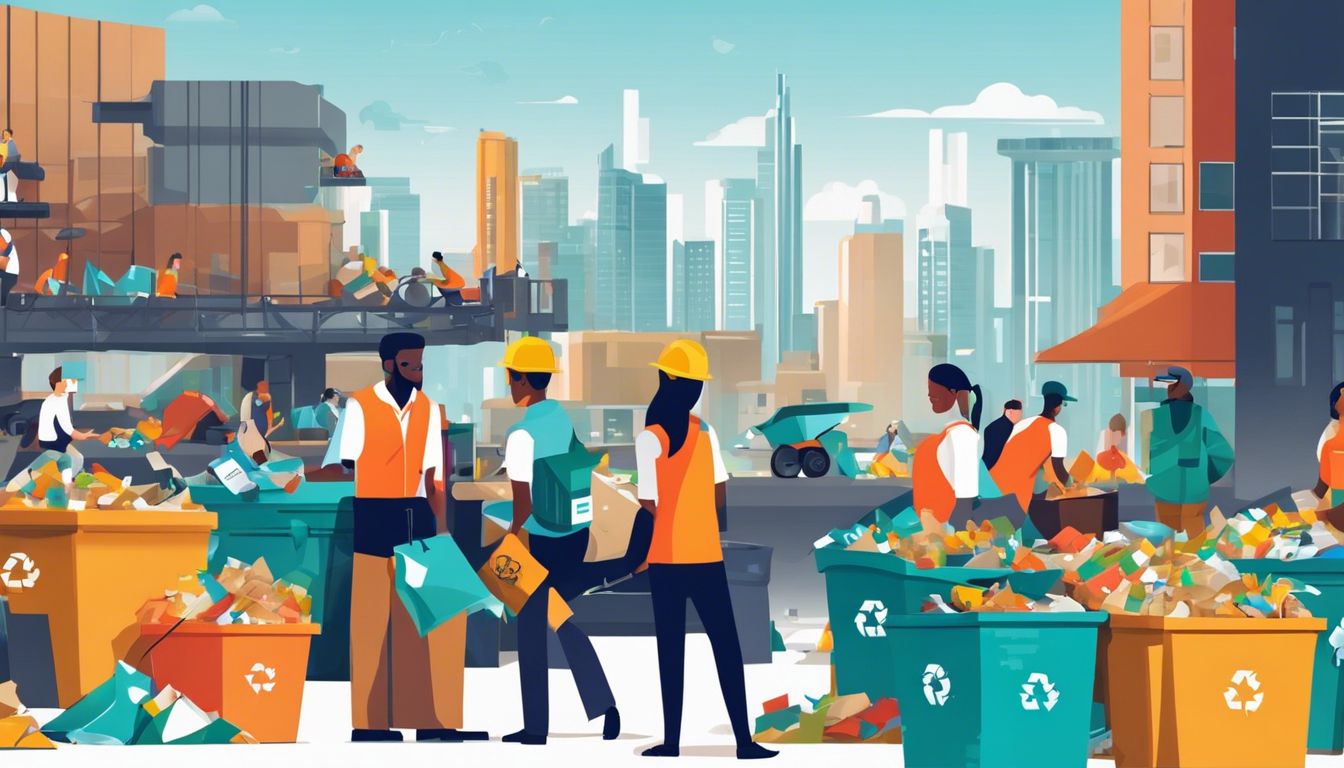
Recycling stands as a cornerstone of the circular economy, an engine driving us towards more sustainable and resource-efficient practices that challenge our traditional ‘take-make-dispose' model.
By reimagining waste not as an endpoint but as the start of a new cycle, recycling propels materials back into the fold, lessening our environmental burden and fostering a greener future.
Understanding the circular economy
The circular economy reshapes the way we use and reuse materials. It's not just about recycling; it's a fresh look at keeping resources in use for as long as possible. In this system, products get designed to last longer, and when they do reach the end of their life, they can be dismantled and turned into something new.
This approach helps cut waste and save money.
Instead of making things, using them once, and throwing them away, the circular economy encourages reusing materials over and over again. Companies that adopt this model play a big part in creating a sustainable future.
They help lower carbon footprints by turning what was once ‘wasted' into valuable resources. Moving on from recycling alone, we see how key players like Veolia are pushing boundaries with innovative programs – let's dive in.
The importance of recycling in the circular economy
Recycling is a key player in the circular economy. It keeps materials in use for as long as possible. This cuts down on waste and reduces the need to extract new resources from our planet.
In a circular system, products get designed for easier recycling, and industries aim to turn waste into new raw materials or energy.
Materials like recycled glass and plastic become part of this loop. They transform back into bottles or apparel, slashing carbon emissions by avoiding new production processes. This not only helps the environment but also drives sustainable development and makes businesses more resilient against resource scarcity.
Cities like Leeds are leading by example with their street recycling points, aiming high with waste reduction goals that support net-zero targets. Company Waste Managers must look at these successful models and leverage recycling as a cornerstone of their own sustainability plans, pushing towards creating less waste right from the start.
With smart strategies in place, companies can make significant strides towards environmental social governance commitments while benefiting financially from efficient supply chain management.
Veolia: Pioneering waste management and recycling
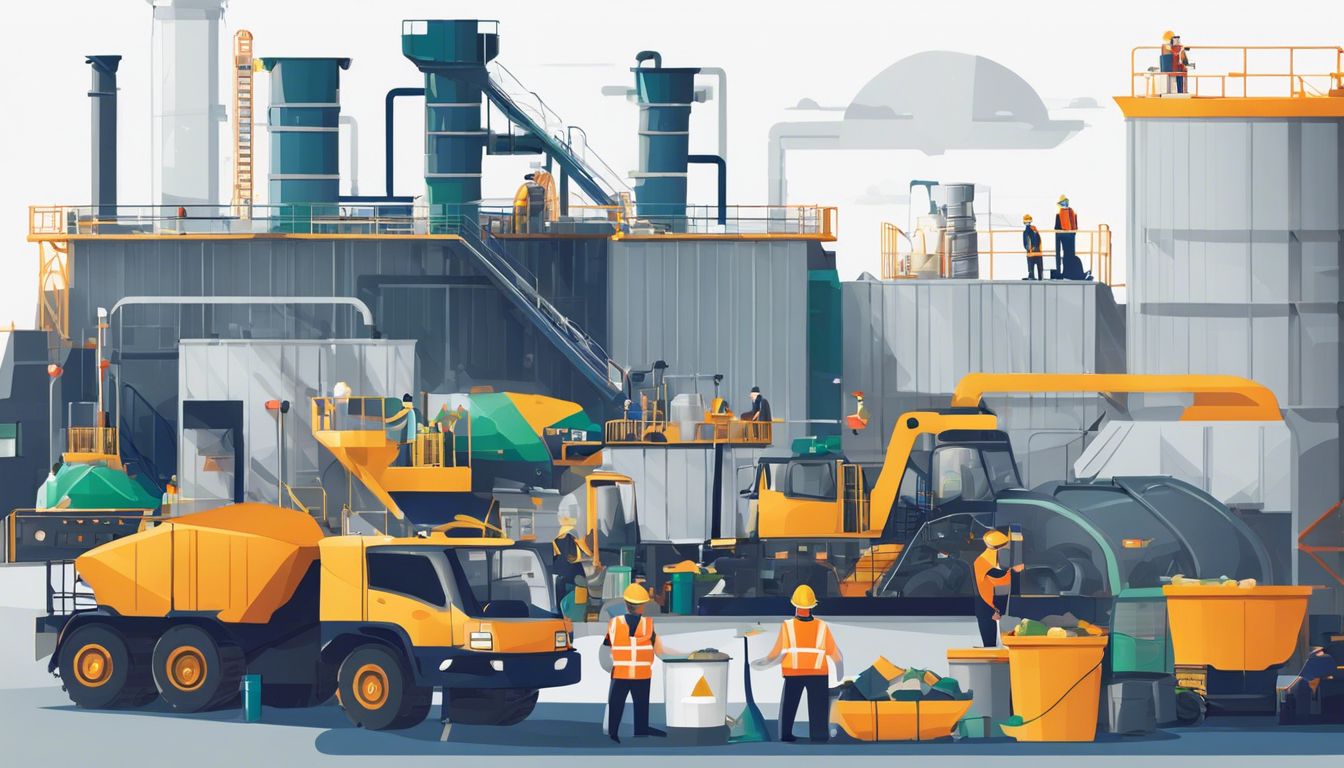
Veolia stands at the forefront of waste management, innovating with recycling programmes that redefine sustainability. Their approach not only diverts waste from landfills but transforms it into valuable resources, reinforcing their position as a key player in advancing the UK's circular economy.
Brief overview of Veolia's recycling programmes
Veolia leads the way in waste management and recycling. Their programmes play a key role in crafting a circular economy.
- Veolia has set up advanced facilities to sort and process recyclable materials. They ensure that paper, plastic, metal, and glass get reused.
- The company turns organic waste into biogas. This process takes food scraps and turns them into clean energy.
- They recycle e-waste, such as old electronics. Items like computers and phones are broken down safely.
- Printer cartridges don't go to waste. Veolia collects them to recover valuable materials.
- Their initiatives help reduce the environmental impact of businesses. They focus on minimising waste production.
- A lot of work goes into promoting sustainable materials management. Veolia's efforts align with global environmental goals.
- Partnering with other firms, they transform plastics into new products. This helps keep plastic waste out of landfills and oceans.
- The company also educates people about the importance of recycling. They encourage more responsible disposal habits.
- Veolia invests in research on biodegradable materials. They are exploring how these can replace non – recyclable options.
- To support the textiles industry, they have programmes for recycling fabric and garments. This reduces fashion's footprint on the planet.
Biffa: Transforming waste into resources
Biffa stands at the forefront of the UK's sustainability quest, ingeniously turning waste into valuable resources; discover how their innovative recycling initiatives are shaping a greener tomorrow.
Brief overview of Biffa's recycling initiatives
- Biffa focuses on converting waste materials back into useful products. This reduces the need for raw materials.
- Their initiatives support environmental, social, and governance (ESG) goals. They aim to cut carbon emissions and reduce landfill use.
- Innovative projects include turning used coffee grounds from coffee shops into biomass fuel.
- The firm collaborates with fashion brands to upcycle textile waste. Old clothes can become new garments or other items.
- Plastic plays a big part in Biffa's operations. They recycle plastic bottles and packaging, keeping them out of oceans and landfills.
- Food waste becomes biofuel or energy through anaerobic digestion processes.
- Biffa offers consultancy services too. They help other businesses manage their waste more sustainably.
- Educational programmes are part of their agenda. They teach communities about the benefits of recycling and proper waste disposal.
- Technology is a key tool for Biffa. Advanced sorting machines separate different types of recyclables efficiently.
- Partnering with other organisations is essential. Together they find new ways to reuse materials that would otherwise be wasted.
Johnson Matthey: Championing sustainability through recycling
At the heart of the circular economy, Johnson Matthey stands out for its commitment to sustainability, embracing recycling as a core component of their operations. Their advanced processes not only recover precious metals but also pave the way for innovative use in various industries, solidifying their position as champions of ecological responsibility.
Brief overview of Johnson Matthey's recycling efforts
Johnson Matthey stands out in the recycling world. Their efforts are setting a standard for sustainability in the UK.
- The company has developed advanced recycling programmes, leading the way in creating a more circular economy.
- They focus on turning waste into valuable resources, helping to reduce the environmental impact of their operations.
- Johnson Matthey's commitment to recycling cuts across various materials, including metals and chemicals.
- Their initiatives support cities' goals to become more sustainable, much like Delhi, Los Angeles, and Leeds.
- Sustainability is at the heart of their mission; they strive to lessen climate change effects through innovative recycling.
- By upcycling materials, they're not only reusing waste but also contributing to financial inclusion and reducing costs.
- The firm plays a crucial part in transforming the fashion industry by providing recycled materials for clothing production.
- They actively participate in global sustainability discussions, aligning with movements led by bodies like the World Economic Forum.
- Through collaboration with waste companies, Johnson Matthey helps create robust recycling programmes within communities.
- Their actions help shape a future where recycled plastic becomes a norm rather than an exception.
Covanta: Turning waste into renewable energy
Covanta stands at the forefront of sustainable waste management, adeptly converting everyday refuse into clean, renewable energy. Their innovative recycling and energy recovery programmes are a testament to their commitment to a greener future, showcasing how materials once destined for landfill can power our communities instead.
Brief overview of Covanta's recycling and energy recovery programmes
Covanta is well-known for its advanced recycling and energy recovery programmes. These initiatives help reduce waste and support environmental protection.
- The company turns non – recyclable waste into renewable energy.
- It operates energy-from-waste facilities that prevent tons of trash from going to landfills.
- Recycling at Covanta includes sorting metals and other materials from waste.
- Recovered metals are recycled and put back into the economy.
- Their process also creates steam, which can power turbines to generate electricity.
- This electricity is used by local communities, reducing the need for fossil fuels.
- Covanta's facilities lower greenhouse gas emissions compared to traditional landfills.
- They partner with businesses to manage and convert waste into clean energy responsibly.
- Through their work, they embody circular economy principles by reusing resources wisely.
- Their commitment also lies in educating communities on sustainable waste practices.
Brief overview of the top UK waste management circular economy initiatives
All the top waste management companies are making big recycling efforts. They've set a standard for others by focusing on circular economy measures to enhance sustainability.
- Reduction of Landfill Waste: These companies emphasise diverting waste from landfills. They strive to find new ways to reuse and recycle materials that others might throw away.
- Sustainable Systems: Waste Management works diligently to design systems that make waste collection and recycling more efficient. This reduces the impact on the environment.
- Commitment to Circular Economy: Their initiatives are driven by the goal of creating a closed-loop system where products are used, recycled, and reused without wasted resources.
- Community Engagement: They engage with local communities to educate and encourage participation in recycling programmes. It's all about making sure everyone knows how important it is to recycle.
- Advanced Technology Use: Many waste management solutions include cutting-edge technology. This tech helps them sort and process recyclables more effectively than ever.
Cutting Costs in Waste Management: How Commercial Waste Disposal Rates Are Being Reduced
Companies are finding new ways to cut waste disposal costs. They use smart technology to sort and reduce rubbish. This means they can recycle more and dump less. Recycling large amounts cuts down on fees for dumping in landfills.
It also follows rules about environmental, social, and governance (ESG) standards.
Businesses that make biofuels or clothing from recycled materials save money too. They turn old stuff like waste toner, plastic bottles, and used shoes into new products. Some even team up with shops like Zara or Patagonia to reuse fabric scraps or worn-out gear.
These partnerships help lower the expense of getting rid of waste while promoting a circular economy.
The Future of Recycling in the Circular Economy
Recycling will play a crucial part in the circular economy‘s growth. The aim is to keep products and materials in use for as long as possible. This cuts down on waste and saves natural resources.
Waste managers can expect recycling methods to become smarter and more efficient. Tech advancements, like AI, will sort recyclables faster and cut contamination.
Firms are set to create tighter loops within their production cycles too. They'll reuse more of their own waste, turning what used to be trash into new products. Businesses that stay ahead of these trends can cut costs and boost their green credentials at the same time.
Looking forward, every part of a product's life could link back into the circular chain. Shoes made from recycled tires or inkjet cartridges refilled for reuse show where we're headed.
Now let’s explore how cutting costs in waste management is key for businesses looking to engage with the circular economy.
Conclusion
Veolia, Biffa, SUEZ, Grundon, and Viridor, plus others such as Johnson Matthey, and Covanta stand tall as recycling champions in the UK. They turn waste into new resources and energy. These firms help cut costs with smart waste management.
Their work boosts circular economies and shines a light on sustainability. It's about making less waste and using what we have wisely. Let's take their lead and make recycling part of our daily routine!
Waste Companies with Recycling Programmes FAQs
1. What are circular economies, and which UK recycling firms lead in this area?
Circular economies focus on reusing materials to reduce waste. In the UK, Enerkem and Lehigh Technologies stand out for turning recycled goods into new products.
2. How is Starbucks contributing to recycling in the UK?
Starbucks in the UK runs a loyalty scheme that rewards customers who recycle their cups or bring reusable ones, helping cut down on plastic waste.
3. Can you tell me about some companies with unique recycling programmes?
Sure! Patagonia Clothing recycles old garments, while a brewer may repurpose grains from brewing to make eco-friendly products. By their nature, all waste companies with recycling programmes create programmes that are unique to their businesses.
4. Does incorporating environmental, social and governance principles help UK recycling firms?
Absolutely! Applying these principles guides companies like DSposal to act responsibly, focusing on sustainability as they manage waste and resources.
5. Are there any innovative ways footwear can be recycled by these green giants?
Yes! Some leading recyclers are finding creative uses for old shoes, transforming them into playground surfaces or even new footwear items.
Top 10 UK Solid Waste Management Companies 2025
The UK waste management sector stands as a vital industry worth billions of pounds. The top UK Solid Waste Management Companies are the leading waste management firms in Britain. These companies handle millions of tonnes of rubbish each year. The industry has transformed significantly over the past two decades through strategic mergers and environmental innovations. […]
Cost of Commercial Waste Disposal UK: Keeping the Numbers Low: What UK Rubbish Really Costs
Managing rubbish costs money. UK companies know this too well, as they deal with heaps of trash every day. Every year, these businesses create 27.5 million tonnes of commercial waste and 13.6 million tonnes of industrial waste – that's a mountain weighing 41.1 million tonnes! Tossing all that waste can eat up to 4-5% of […]
e-waste recycling companies for businesses: No Digital Dumping. Instead apply the best E-Waste Solutions
E-waste recycling for businesses is a big deal. It's about getting rid of old electronics the right way. In 2016, we had 44.7 million tons of e-waste around the world, but only a bit got recycled properly. That's not good because this stuff has harmful things like mercury and lead that can hurt our planet […]
Comparing US Waste Disposal Companies: Top Landfill Waste Competitors: The Ultimate Eco Disposal Company Showdown
Waste disposal companies play a big role in how we take care of our planet. They handle the trash and recycling from homes, businesses, and cities. Some of the biggest names in this industry are Waste Management, Republic Services, Veolia North America, Rumpke Waste & Recycling, and Casella Waste Systems, Inc. These companies work to […]
